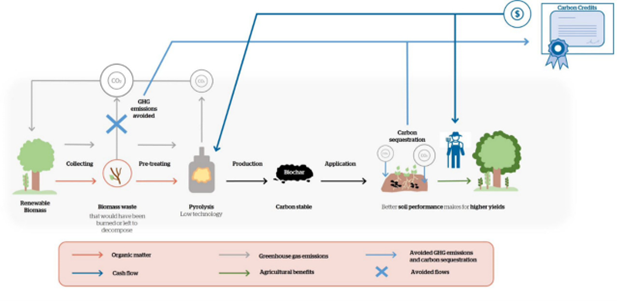An article by Ana Vega
Biochar carbon credits have emerged as an innovative solution to mitigate the effects of climate change.
What are biochar credits?
Biochar is a special type of charcoal that is produced from biomass, a type of renewable energy that occurs organically in nature. This type of energy is mainly transformed to replace fossil fuels through a thermochemical process called pyrolysis. Pyrolysis is a process in which organic materials, such as agricultural and forestry residues, are heated at high temperatures without oxygen, transforming them into gas, oil and biochar. This technique is used in rural areas without access to electricity to make use of waste and obtain energy.
Biochar and the fight against climate change
When biochar is incorporated into agricultural or forestry soils, it can sequester organic carbon and nutrients for very long periods of time. Unlike other carbon sequestration methods, biochar can store carbon in the soil for hundreds or thousands of years.
As we know, carbon credits are units used to offset greenhouse gas emissions. Each credit represents one metric ton of CO2 equivalent that has been avoided, reduced or captured. This is where biochar comes into play: by using it and increasing the carbon content of soils, carbon credits can be generated and sold on markets or used to offset emissions.
Verified Carbon Standard (VCS) published a methodology in August 2021 that establishes rules for measuring carbon and determining which biochar projects are eligible. This methodology provides a clear framework for evaluating and supporting biochar projects. It is estimated that by 2050, biochar could capture up to 2 GtCO2 per year at a cost of $30-$120 per ton of CO2.
Other benefits of biochar
In addition to its impact on climate change mitigation, biochar offers other benefits:
- It improves soil quality by retaining water and nutrients, which supports the growth of healthy plants and crops.
- It reduces the need for chemical fertilizers, thus contributing to the protection of our ecosystems and water resources.
In summary, biochar carbon credits are a valuable tool in the fight against climate change. By using biochar to sequester carbon in the soil, it reduces greenhouse gas emissions, improves soil quality and promotes agricultural sustainability.







